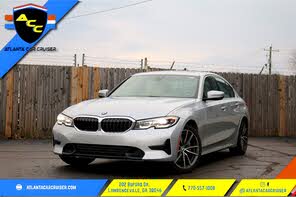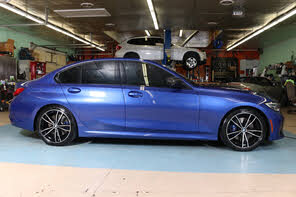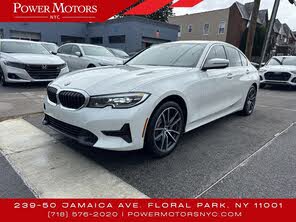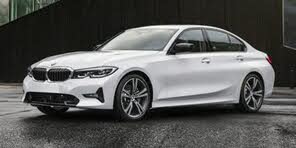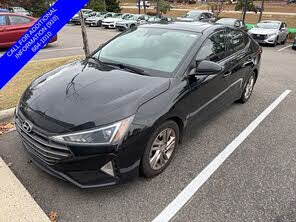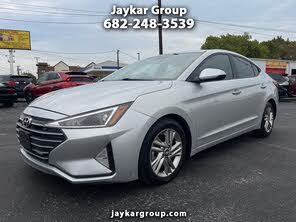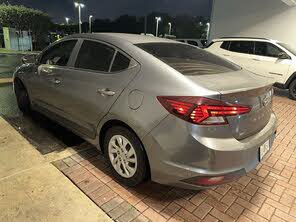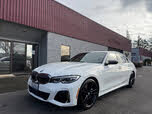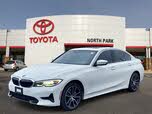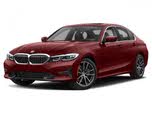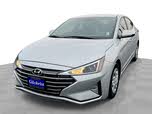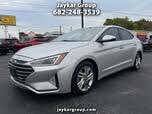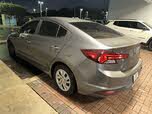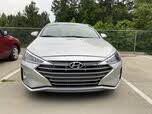2020 BMW 3 Series vs 2019 Hyundai Elantra
Overview | |
MSRP$17,200 | MSRP$40,750 |
Listings739 | Listings628 |
Ratings & Reviews | |
User Reviews | User Reviews |
Expert reviews8.2 out of 10 | Expert reviews8.2 out of 10 |
Pros
Cons
| |
2019 Hyundai Elantra Reviews SummaryCustomer satisfaction is dependent on multiple factors. For example, let's say you go out to a new restaurant. Even if the service is great, or the bill is inexpensive, or the restaurant has a lovely ambiance, you probably won't go back if the food doesn't taste good. The updated and upgraded 2019 Hyundai Elantra is like that—unless you buy the turbocharged Sport trim. | |
2020 BMW 3 Series Reviews SummaryDoes BMW still use “The Ultimate Driving Machine” as its advertising tagline? Yes, it does. And with the arrival of the 2020 BMW M340i, which slots between the existing 330i and the forthcoming M3, the company proves there is substance behind the slogan. | |
Popular Features & Specs | |
Engine2.0L 147 hp I4 | Engine2.0L 255 hp I4 |
Drive TrainFWD | Drive TrainRWD |
Seating Capacity5 | Seating Capacity5 |
Horsepower147 hp @ 6200 rpm | Horsepower255 hp @ 5000 rpm |
MPG City26 | MPG City26 |
MPG Highway36 | MPG Highway36 |
Engine | |
Engine Name2.0L 147 hp I4 | Engine Name2.0L 255 hp I4 |
Torque132 lb-ft @ 4500 rpm | Torque295 lb-ft @ 1450 rpm |
Horsepower147 hp @ 6200 rpm | Horsepower255 hp @ 5000 rpm |
DrivetrainFWD | DrivetrainRWD |
Fuel Economy | |
MPG City26 | MPG City26 |
MPG Highway36 | MPG Highway36 |
Interior | |
Seating Capacity5 | Seating Capacity5 |
Key Features | |
Navigation System | Navigation SystemStandard |
Sunroof/Moonroof | Sunroof/MoonroofStandard |
Safety | |
Front Crash Overall4 | Front Crash Overall |
Side Crash Overall4 | Side Crash Overall |
Dimensions & Capacity | |
Cargo Space14.4 cu ft | Cargo Space13.0 cu ft |
Curb Weight2972 lbs | Curb Weight3589 lbs |
Height56.5 in | Height56.8 in |
Length181.9 in | Length185.7 in |
Width70.9 in | Width81.4 in |
Wheelbase106.3 in | Wheelbase112.2 in |
Number of doors4 | Number of doors4 |
Overview | ||
MSRP | $17,200 | $40,750 |
Listings | ||
Ratings & Reviews | ||
User reviews | ||
Expert reviews | 8.2 out of 10Read full review | 8.2 out of 10Read full review |
Pros & cons | Pros
Cons
| |
Summary | Customer satisfaction is dependent on multiple factors. For example, let's say you go out to a new restaurant. Even if the service is great, or the bill is inexpensive, or the restaurant has a lovely ambiance, you probably won't go back if the food doesn't taste good. The updated and upgraded 2019 Hyundai Elantra is like that—unless you buy the turbocharged Sport trim. | Does BMW still use “The Ultimate Driving Machine” as its advertising tagline? Yes, it does. And with the arrival of the 2020 BMW M340i, which slots between the existing 330i and the forthcoming M3, the company proves there is substance behind the slogan. |
Video | ||
Popular Features & Specs | ||
Engine | 2.0L 147 hp I4 | 2.0L 255 hp I4 |
Drive Train | FWD | RWD |
Seating Capacity | 5 | 5 |
Horsepower | 147 hp @ 6200 rpm | 255 hp @ 5000 rpm |
MPG City | 26 | 26 |
MPG Highway | 36 | 36 |
Engine | ||
Engine Name | 2.0L 147 hp I4 | 2.0L 255 hp I4 |
Torque | 132 lb-ft @ 4500 rpm | 295 lb-ft @ 1450 rpm |
Horsepower | 147 hp @ 6200 rpm | 255 hp @ 5000 rpm |
Drivetrain | FWD | RWD |
Fuel Economy | ||
MPG City | 26 | 26 |
MPG Highway | 36 | 36 |
Interior | ||
Seating Capacity | 5 | 5 |
Key Features | ||
Navigation System | Standard | |
Sunroof/Moonroof | Standard | |
Safety | ||
Front Crash Overall | 4 | |
Side Crash Overall | 4 | |
Dimensions & Capacity | ||
Cargo Space | 14.4 cu ft | 13.0 cu ft |
Curb Weight | 2972 lbs | 3589 lbs |
Height | 56.5 in | 56.8 in |
Length | 181.9 in | 185.7 in |
Width | 70.9 in | 81.4 in |
Wheelbase | 106.3 in | 112.2 in |
Number of doors | 4 | 4 |
Two years prior, Hyundai had redesigned the Elantra, giving it a sophisticated look inspired by the Genesis G80 sedan. The 2017 Elantra appeared upscale and conservatively styled, with no lines or proportions out of place. For 2019, the Elantra received new styling elements forward of the windshield and front doors, redesigned wheels, and a new trunk lid, taillights, and rear bumper. The design was more geometric and less appealing than the previous year. Inside, subtle changes improved the interior, adding design flair to the air vents, a carbon-texture finish to some plastic housings, new gauges, and revised dashboard controls. The interior quality was high, with a robust shifter and tightly assembled parts, though some materials felt inexpensive.
The Elantra was available in two models: the 5-door hatchback "GT" and the 4-door sedan in SE, SEL, Value Edition, Eco, and Limited trims. Prices for the sedan started at $17,100, plus $885 for the destination charge. The Limited test vehicle had a base price of $23,485, with the Ultimate Package adding $3,350 worth of equipment, including advanced safety features and a navigation system. Optional floor mats brought the total to $26,690, including destination charges.
The 2020 BMW 3 Series had an aquatic appearance with lidded headlights, a bulging curved hood, wide lower air intakes, and an oversized grille. Despite its high price, starting at $40,750 for a base 330i and rising to $56,000 for the M340i with xDrive, the 3 Series was praised for its driving dynamics. The M340i xDrive test car had nearly $14,000 in additional options, totaling $69,570. The 3 Series offered a variety of interior colors and materials, with the test car featuring off-white Ivory leather and a Tanzanite Blue exterior paint upgrade. The interior looked and felt high-quality, with some controls being hard to find or cryptic. The widescreen infotainment system was well-integrated, and the iDrive system was the best version yet, with an excellent natural voice recognition system.


















The 2019 Hyundai Elantra, equipped with a 2.0-liter 4-cylinder engine producing 147 horsepower, relied on a 6-speed automatic transmission to power the front wheels. Acceleration was acceptable, with driving modes including Normal, Sport, and Smart. The EPA estimated 32 mpg in combined driving, and the test car returned 29.3 mpg on a modified testing loop, with a trip computer reading of 32.4 mpg after a week of driving. Handling was decent, with no significant praise or criticism for the steering and brakes. The ride quality was busy due to the inexpensive torsion-beam rear-axle suspension, making the car not terribly rewarding to drive but not aggravating either.
The 2020 BMW 3 Series had significant structural and suspension changes, contributing to its return to the handling podium. The M340i trim featured a turbocharged 3.0-liter inline 6-cylinder engine making 382 horsepower and 369 pound-feet of torque, BMW’s rear-biased xDrive all-wheel-drive system, a rear M Sport differential, and massive M Sport brakes. The M340i xDrive could rocket to 60 mph in 4.1 seconds, according to BMW. The 8-speed automatic transmission, while not a manual, was expertly calibrated and complemented the car's performance. The M340i's engineering package made it a joy to drive, with the automatic transmission and paddle shifters proving beneficial in real-world driving.
The 2019 Hyundai Elantra offered good front-seat comfort for a compact car, with height-adjustable seats in all trims. Most Elantras had heated front seats, a leather-wrapped tilt-and-telescopic steering wheel, and dual-zone automatic climate control. Backseat comfort was less impressive, with hard plastic front seatbacks and no air conditioning vents or USB ports. Interior storage was decent, with a good-size center-console storage bin, a sizable glove box, and a tray for smartphones. The Limited trim included a wireless charging pad. The trunk offered 14.4 cubic feet of space, with a hands-free Smart Trunk feature in most trims.
The 2020 BMW 3 Series had simple and supportive front seats, equipped with high-quality leather, front-seat heaters, and a heated steering wheel. Rear-seat entry and exit were awkward, but the seats provided terrific support and substantial side bolsters. Some controls were hard to find or cryptic, but the widescreen infotainment system was well-integrated, and the iDrive system was the best version yet. Storage space was generous, with a covered bin forward of the shifter containing an optional wireless smartphone charger. The trunk offered 17 cubic feet of space, though it was narrow and deep.
The 2019 Hyundai Elantra, except for the base SE, came with a 7-inch touchscreen infotainment system running Apple CarPlay, Android Auto, and satellite radio. The Limited trim included an Infinity premium sound system, and the Ultimate Package added an 8-inch display screen, navigation system, and SiriusXM Data Services. The infotainment system was easy to use, with the right number of knobs and buttons. The Limited trim also provided a free 3-year trial subscription to Blue Link services, offering a long list of safety and convenience functions.
The 2020 BMW 3 Series featured the latest version of the iDrive infotainment system, with a touchscreen display, natural voice recognition, and gesture control. The controls on the center console were minimalistic but harder to use by touch. The touchscreen was intuitive, and the voice recognition system was excellent, responding to natural commands. The test car also had the latest BMW head-up display, visible while wearing polarized sunglasses.
The 2019 Hyundai Elantra included important driver-assistance and collision-avoidance systems starting with the SEL trim, such as forward-collision warning, automatic emergency braking, lane-departure warning, lane-keeping assist, blind-spot monitoring, and rear cross-traffic alert. The Limited trim added adaptive cruise control, pedestrian detection, automatic high-beam headlights, and a Safe Exit system. The Elantra received top marks from the IIHS, except for an Acceptable rating for LATCH child-seat anchors. The NHTSA gave the Elantra a 4-star overall rating.
The 2020 BMW 3 Series required two Driving Assistance option packages for the latest ADAS. The systems were accurate but sometimes lacked smoothness. The lane-keeping assist system was abrupt, reminding drivers to pay attention. The 3 Series received a Top Safety Pick+ rating from the IIHS when equipped with adaptive full LED headlights.
CarGurus highlights

According to CarGurus experts, the overall rating for the 2019 Hyundai Elantra is 8.2 out of 10, while the 2020 BMW 3 Series scores 8.2 out of 10. Given these identical ratings, the final recommendation hinges on your priorities. If you seek a budget-friendly, practical, and well-equipped compact car, the Hyundai Elantra is an excellent choice. However, if you desire a luxury sedan with superior driving dynamics, advanced technology, and high-quality materials, the BMW 3 Series is the better option.
Choose the 2020 BMW 3 Series if:
- You seek a luxury sedan with exceptional driving dynamics and performance.
- You prefer advanced technology features, including a sophisticated infotainment system.
- You prioritize a high level of interior comfort and quality materials.
Choose the 2019 Hyundai Elantra if:
- You want a budget-friendly compact car with a starting price of $17,100.
- You value a straightforward and easy-to-use infotainment system.
- You appreciate a high-quality interior with practical storage solutions.
CarGurus highlights

According to CarGurus experts, the overall rating for the 2019 Hyundai Elantra is 8.2 out of 10, while the 2020 BMW 3 Series scores 8.2 out of 10. Given these identical ratings, the final recommendation hinges on your priorities. If you seek a budget-friendly, practical, and well-equipped compact car, the Hyundai Elantra is an excellent choice. However, if you desire a luxury sedan with superior driving dynamics, advanced technology, and high-quality materials, the BMW 3 Series is the better option.
Choose the 2020 BMW 3 Series if:
Shop Now- You seek a luxury sedan with exceptional driving dynamics and performance.
- You prefer advanced technology features, including a sophisticated infotainment system.
- You prioritize a high level of interior comfort and quality materials.
Choose the 2019 Hyundai Elantra if:
Shop Now- You want a budget-friendly compact car with a starting price of $17,100.
- You value a straightforward and easy-to-use infotainment system.
- You appreciate a high-quality interior with practical storage solutions.

By: CarGurus + AI
At CarGurus, our team of experienced automotive writers remain at the heart of our content operation, conducting hands-on car tests and writing insightful guides that are backed by years of industry experience. To complement this, we are harnessing AI to make our content offering more diverse and more helpful to shoppers than ever. To achieve this, our AI systems are based exclusively on CarGurus content, ratings and data, so that what we produce is both unique to CarGurus, and uniquely helpful to car shoppers.


